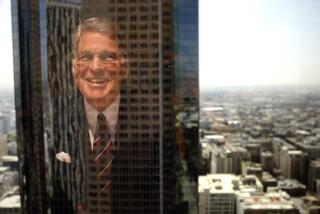Accountant Stan Ross has real estate all figured out
- Share via
The gig: After a long career as one of the country’s most influential real estate accountants, Stan Ross is teaching and mentoring college students as chairman of the USC Lusk Center for Real Estate.
Humble beginnings: Ross was born in 1936 in the Bronx, where he grew up and enjoyed playing basketball on public courts. In high school he found part-time work in a belt factory, and the monotonous labor of cutting belts motivated him to further his education at the City College of New York business school. Now known as Baruch College, the school teaches accounting in the Stan Ross Department of Accountancy.
Lesson from the streets: “I learned in the Bronx, when you walk down an alley something bad might happen; therefore you should identify at least two or three exits before you walk down it.”
He recommends such a strategy of forethought in sizing up property before investing. “Can I finance it? Can I refinance it? Could I exchange it? Could I sell it? I know my options upfront.”
Starting a career: After college and Army service, Ross answered an ad placed by Los Angeles accountant Kenneth Leventhal. The two hit it off immediately, and Ross moved his young family to the Southland in 1961 even though he didn’t know yet whether he had passed the exam to become a certified public accountant. Ross did pass, of course, and he and his partner went on to build Kenneth Leventhal & Co. into the ninth-largest accounting firm in the country. Leventhal died last year at age 90.
Formulating a growth strategy: In the mid-1960s, real estate emerged as a crucial component of corporate mergers and acquisitions, and Ross began to advise some of the nation’s biggest property owners and developers.
Soon, “we were identified as the most prominent firm in the real estate industry,” Ross said.
Among the firm’s clients were paper industry giant Boise Cascade Co., home builder Levitt & Sons and sewing machine maker Singer Co. In a mid-1970s bidding war for Irvine Co. in Orange County, Ross represented major real estate developers, including A. Alfred Taubman and Donald Bren.
Hitting a speed bump: When recession hit the country in the early 1970s, some of the mergers and other real estate deals Ross’ firm had arranged started to unravel and little new merger business was on the horizon.
“Our competitors thought we wouldn’t make it because we were so specialized,” Ross said.
He and Leventhal pivoted the firm’s focus to helping troubled companies reorganize, preferably outside Bankruptcy Court. In the 1970s, Ross moved to New York temporarily to help developer Donald Trump restructure his business.
Personal exit strategy: In 1995, Leventhal & Co. merged with accounting giant Ernst & Young, and Ross became managing partner of the firm’s real estate accounting practice and a vice chairman of the firm. He retired from Ernst & Young in 1999 but continues to work as a consultant.
The allure of academe: As the chairman of the USC Lusk Center since 2000, Ross has been able to propel what is now called the Ross Minority Program in Real Estate. Born in response to the 1992 Los Angeles riots, the program teaches real estate skills that graduates can use to revitalize neglected urban neighborhoods. Ross likes to help students find their strengths and strategize about their careers.
“I love teaching and mentoring kids,” said Ross, 77, who has dialed back his work schedule to five days a week. Now, he spends more time with his wife of 56 years, Marilyn, and their three daughters and 12 grandchildren. The Rosses live in Century City.
Advice: Looking back, he offers this: “Being able to reinvent yourself works — I went from accountant to consultant to merger guy to helping people restructure and reorganize. Read everything you can and stay current. I think that’s critical.”
Twitter: @rogervincent
More to Read
Inside the business of entertainment
The Wide Shot brings you news, analysis and insights on everything from streaming wars to production — and what it all means for the future.
You may occasionally receive promotional content from the Los Angeles Times.











